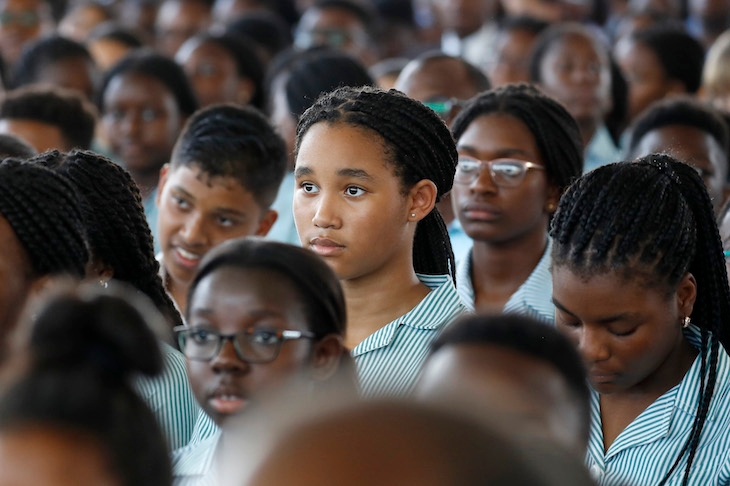For any bosses from the Singapore education department reading this, I have a message. It comes from (I’d guess) most of your schoolchildren. They detest their education system. They burn with resentment at the way their schooling tries (they think) to shackle their imaginations, their individuality, their free spirit. They hate being forced to compete, and are made miserable about what they see as learning by rote.
That’s the bad news. But the good news is this. However they may chafe at the way they are taught, these children are anything but broken reeds. Imaginative, rebellious, thoughtful, original, poetic, these winning boys and girls (often of Chinese origin!) write English like little angels. How do I know? Because this year I joined the judges of the junior section of the Queen’s Commonwealth Essay Competition.
This annual contest, born in imperial times — 1883 — is the world’s oldest international writing competition for schoolchildren. This year some 12,000 children from across the Commonwealth took part. HRH Camilla, Duchess of Cornwall, the vice-patron representing the Queen, has overseen the competition; and the Duchess was at Buckingham Palace at the end of last month for the presentation. So was I. And so were all the young winners, wide-eyed at the splendour. They had been flown over from Pakistan, Canada and Singapore for the awards ceremony. I felt lucky to meet them, and proud to be among the judges as part of this vigorous-feeling institution. The children read extracts from their winning entries; and the Duchess seemed genuinely involved, staying for ages afterwards, chatting to children and schoolteachers.
But my pleasure at being involved was tinged with sadness. In order to choose the winner and runner-up of the junior competition, my fellow judges and I had been given the whole ‘shortlist’, which was anything but short. I had read every word of more than 70 essays from all over the world — Canada, Kenya, Tanzania, Singapore, Pakistan, Jersey… — and with every essay the heart sank. The quality was uniformly excellent, the creative writing exceptional, and (beyond mere fluency, though this was outstanding) the imaginativeness of these boys and girls had surprised me. But oh, the sorrowfulness of these young spirits!
Entrants could choose their subject from a number of topics but, essentially, all invited the writer to describe visions of the future. And these kids were so depressed! I can recall only one among them (an essay by a Christian boy from Kenya about a church outing) that was infused by anything like a sense of optimism. The rest sounded so pessimistic, so sad, so full of foreboding. Children wrote like prisoners on death row. Here’s our junior runner-up, the Canadian Floria Gu, 13, a tiny, bright-eyed girl of Chinese extraction, whose essay was cast as a poem about her imaginary self walking through our future world, an environmentally devastated wasteland, and recalling with verdant memory the beautiful planet we destroyed (‘an imagined home I did not inherit’):
once, my mother said
they called it
a city.
jagged silhouettes
of long gone giants; wire frames
embedded in heat-soaked stone
they claw at the ashen sky
metal monoliths piercing
coal clouds that smother
my world in darkness.
with each step, dust stirs
and collects in swarms
over deserted skeletons,
each heave of my lungs prey
to their scorched invasion …
Little Floria walks through this hell, hand-in-hand with a pale, emaciated girl called Summer. Scores of these essays conjured up versions of the same baleful vision. Another theme was man’s inhumanity to man, poverty, and the horrors of terrorism and civil war. And again and again from girls’ essays, the subjection of women. The winning entry in the senior section (Zahra Hussain, 17, from Pakistan) took us into the dream of a rich girl: ‘The red of her veil formed from blood instead of chiffon; and the gold from her jewellery now merely the metal her chains were made of.’
Among the cleverest and most affecting was our junior winner, Janine Shum (13) from Singapore. Her essay ‘Our common world: two voices’ presented two poems side-by-side, with a commentary explaining that one was the (fictional) testimony of a girl from Singapore, another from an imagined Afghan girl, both aged 12. The Afghan child’s witness is to her subjection as a woman:
My mother tells me, Hide your face, people are looking.
I reply, I am also looking at them.
Concealed women
So little for so many.
Failure. Frustration.
We are at war
For freedom
To live, to learn.
At 12 years old, I have sacrificed my childhood
Sold into marriage …
The walls close in.
I hunger and thirst
In this landscape of landmines…
Ms Shum’s depiction of the very different woes of a Singaporean child reflects the rage of many entries from that city-state:
Burdened with expectations,
Teachers saying Everyone else can do it
There is no time
For my true self
There is no room for mistakes.
I surrender hobbies, sleep, weekends …
Don’t ask why. No
Exploring, trial and error
I am told what I should become:
King of the hill, top rat.
Shum explains that although this girl has every material need provided for, ‘she is forced to suppress her curiosity and just memorise answers in order succeed in the national exam’. It’s all about numbers, facts, figures, she laments… ‘and the number on her tests is all that matters to everyone’.
So which is it to be? The consensus from these essays is that the future’s a choice between environmental devastation, third world poverty, violence and war, or first world regimentation and the suppression of the individual human spirit.
Would essays from my childhood generation in the 1950s have been so bleak? No. But would there have been such a flowering of independent and creative writing? No. And two cheers for that.







Comments